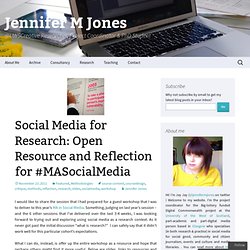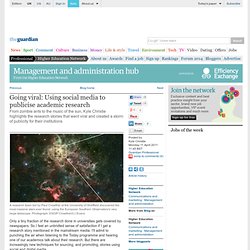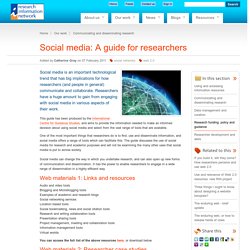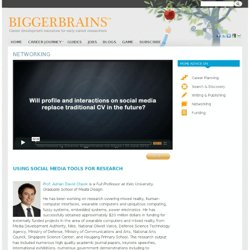

Al-Qaïda et les réseaux sociaux. Social Media for Research: Open Resource and Reflection for #MASocialMedia. I would like to share the session that I had prepared for a guest workshop that I was to deliver to this year’s MA in Social Media.

Something, judging on last year’s session – and the 6 other sessions that I’ve delivered over the last 3-4 weeks, I was looking forward to trying out and exploring using social media as a research context. As it never got past the initial discussion “what is research?” I can safely say that it didn’t work well for this particular cohort’s expectations. What I can do, instead, is offer up the entire workshop as a resource and hope that perhaps others might find it more useful. Below are slides, links to resources and readings and some reflection about teaching social media for research, can it be delivered as a simple one to many lecture? Social Media for Research: Workshop Plan Level: Masters/PhD Overview Explore social media’s role when compiling a research methodology from an academic and commercial perspective. Materials Procedures Slides: www.ciber-research.eu/download/20101111-social-media-report.pdf.
How Twitter will revolutionise academic research and teaching. Going viral: Using social media to publicise academic research. A research team led by Paul Crowther at the University of Sheffield discovered the most massive stars ever found, using the European Southern Observatory's very large telescope.

Photograph: ESO/P Crowther/CJ Evans Only a tiny fraction of the research done in universities gets covered by newspapers. So I feel an unbridled sense of satisfaction if I get a research story mentioned in the mainstream media. I'll admit to punching the air when listening to the Today programme and hearing one of our academics talk about their research. But there are increasingly new techniques for sourcing, and promoting, stories using social and digital media. Take the story about, Alex Baker and Chris Rose, two PhD students that sent a helium balloon up to the edge of space, with two cameras in an insulated box suspended below. Once I'd got the extra details from the students and chosen the pictures, the release needed to be written. I took a couple of lessons from this. Social media: A guide for researchers. Social media is an important technological trend that has big implications for how researchers (and people in general) communicate and collaborate.

Researchers have a huge amount to gain from engaging with social media in various aspects of their work. This guide has been produced by the International Centre for Guidance Studies, and aims to provide the information needed to make an informed decision about using social media and select from the vast range of tools that are available.
One of the most important things that researchers do is to find, use and disseminate information, and social media offers a range of tools which can facilitate this. The guide discusses the use of social media for research and academic purposes and will not be examining the many other uses that social media is put to across society. Social media can change the way in which you undertake research, and can also open up new forms of communication and dissemination. Web materials 1: Links and resources. Using social media tools for research. Prof.

Adrian David Cheok is a Full Professor at Keio University, Graduate School of Media Design. He has been working on research covering mixed reality, human-computer interfaces, wearable computers and ubiquitous computing, fuzzy systems, embedded systems, power electronics. He has successfully obtained approximately $20 million dollars in funding for externally funded projects in the area of wearable computers and mixed reality from Media Development Authority, Nike, National Oilwell Varco, Defense Science Technology Agency, Ministry of Defense, Ministry of Communications and Arts, National Arts Council, Singapore Science Center, and Hougang Primary School.
Biggerbrains had an opportunity to speak to Prof.